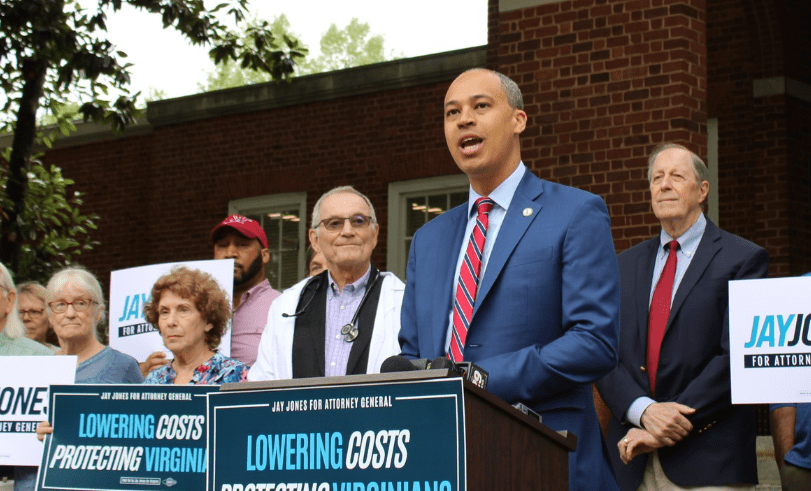
(Photo from Jay Jones' Facebook page)
Listen to the audio version of this article (generated by AI).
- Both sides of the political aisle should never be free from criticism.
Political rhetoric is nothing new. Unfortunately, the same goes for violent rhetoric. Given that we live in an age dominated by social media, we are bound to encounter both more often than we did in decades past. And bad content is disseminated in ways the good content never is. As a result, we’re sometimes left with a dilemma: do we vocally condemn it?
Both sides of the political aisle should never be free from criticism. And while most concerned Americans gravitate toward one side or the other, both parties have their own set of problems. Two recent examples prove this to be true. But the reactions to both have varied greatly.
Jay Jones is the Democratic nominee for attorney general in Virginia. At the beginning of October, text messages Jones sent in 2022 surfaced in an article at National Review. The messages were violent in nature. Speaking of certain Republican colleagues, he said “If those guys die before me, I will go to their funerals to piss on their graves.” But worst of all, Jones fantasized about shooting then-Speaker of the House Todd Gilbert, a Republican. He went on to also say, “I mean do I think Todd and Jennifer are evil? And that they’re breeding little fascists? Yes.” Clearly, this was threatening language not only against Gilbert, but his wife and kids as well. Jones has publicly apologized for his words. But he hasn’t dropped out. And most in his party have rallied around him. Virginia Democratic gubernatorial nominee Abigail Spanberger has openly condemned Jones’ words, but is not calling for him to drop out, either. In a debate with her Republican opponent, Lieutenant Governor Winsome Earle-Sears, Spanberger refused to withdraw her endorsement of Jones and evaded pointed questions on more than one occasion.
On October 14, Politico published an exclusive piece titled “‘I love Hitler’: Leaked messages expose Young Republicans’ racist chat.” The piece was a dive into a private Telegram chat between several leaders from Young Republican groups around the country. Among other things, the chat included racial slurs, “referred to rape as ‘epic’ “, sending people to gas chambers, claiming love for Hitler, degrading comments about Jews, and so on. The participants, all Gen Z and Millennials, aren’t running for office, but they are in leadership positions or work elsewhere in politics and government. According to Politico, “one member of the group chat is no longer employed at their job and another’s job offer was rescinded.” Multiple Republican politicians have denounced the chat contents, all which apparently took place between January and August of this year.
After the Politico piece, the Virginia Democratic Party put out a memo saying, “Sears Must Call on All Young Republicans Implicated in Racist Text Scandal to Step Down from Their Positions.” In a response post on X, Lieutenant Governor Winsome Earle-Sears said, “Easy, they absolutely must step down. Now it’s your turn, Abigail.” What the Virginia Democrats thought they would accomplish is unknown. But immediately, Earle-Sears looked far more capable than her opponent.
It’s disappointing but not quite surprising that this kind of talk occurs. Whether or not you believe private messages should be publicly exposed is a personal opinion. But if and when they are, there should first be public apologies. Second, if the person is in a position of leadership/running for office, they should step down or drop out. Do we really want individuals with violent murder fantasies or a love for Hitler and hatred of Jews to be in prominent roles? No. Lessons absolutely must be learned and there must be consequences. Basic human decency should rule the day.
It is seemingly impossible for Abigail Spanberger to respond appropriately in the Jay Jones situation. Yet Winsome Earle-Sears, when faced with a similar situation, rejected tribalism in favor of morality. This should not be so hard.
These scenarios have occured in the past and are more likely to occur now and in the future, thanks to the internet. So when individuals in the spotlight are asked to respond to them, what they say and how quickly they say it actually matters. It is no use applying standards to just political opponents. They should be applied across the board covering those furthest away from us ideologically as well as those we consider our allies. Some argue this is bad politics. But there are many things far more important than politics and political calculation. The fact that so many think politics should rule the day means it’s become like a religion in this country. And that is not good.
We already have far too many real-life examples of political violence. In July 2024, Donald Trump was almost assassinated on the campaign trail. Last December, Luigi Mangione shot and killed healthcare CEO Brian Thompson and is treated as a sort of political folk hero. In April, a man broke into Pennsylvania Governor Josh Shapiro’s home while the family slept and threw a Molotov cocktail, setting the entire residence on fire. In June, Minnesota representative Melissa Hortman and her husband Mark were assassinated in their home. In September, political activist Charlie Kirk was shot and killed while speaking at a college event.
The fact that so many of these horrific incidents have occurred in such a short span of time means we have a very serious cultural problem. It’s a problem that is only going to fester and grow, not quietly go away. Since that’s the case, it is quite obvious that words of condemnation and calls for consequence should not be withheld. The only way to get rid of the cancer is by excision.
By not hesitating to call out the bad on her side, Lt. Gov. Winsome Earle-Sears demonstrated just how to do these things. If anything, we need more of that unapologetic adherence to ethics. It’s not particularly popular because it requires that at some point, you’ll have to turn the accusing finger on a supposed ally. But the need for consistency matters more. A moral compass should work all the time, not just when it’s best for you.











